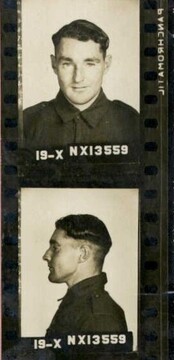CUSACK, Percy James
| Service Number: | NX13559 |
|---|---|
| Enlisted: | 29 April 1940 |
| Last Rank: | Private |
| Last Unit: | 2nd/1st Infantry Battalion |
| Born: | Grenfell, New South Wales, Australia, 18 January 1918 |
| Home Town: | Not yet discovered |
| Schooling: | Not yet discovered |
| Occupation: | Labourer |
| Died: | Matraville, New South Wales, Australia, 1967, cause of death not yet discovered |
| Cemetery: | Not yet discovered |
| Memorials: | Ballarat Australian Ex-Prisoners of War Memorial |
World War 2 Service
| 29 Apr 1940: | Enlisted Australian Military Forces (WW2) , Private, NX13559, 2nd/1st Infantry Battalion | |
|---|---|---|
| 25 Jan 1946: | Discharged Australian Military Forces (WW2) , Private, NX13559, 2nd/1st Infantry Battalion |
Help us honour Percy James Cusack's service by contributing information, stories, and images so that they can be preserved for future generations.
Add my storyBiography contributed by Harrison Smith
Extract from NX13559 Percy Cusack's POW Questionnaire, about his escape.
"I escaped on 19 Jun 41 from No 2 Prison Camp, SALONIKA through a 200 yard long sewer. I was with a Cypriot called "LEMINOS". He took me to a civilian house gave me some clothes and a bath. I was taken into another house and met two Australians - Jack ELLIS and McCORMICK both of 7 Div Provost.
After we had been at this house for about five days, a Greek who represented an American leather company took us to his own house. We stayed there overnight. Next day an Arab came, talked to us for a while, went outside and returned with two Germans. They stuck guns in our faces and took us to No. 1 Prison Camp, This was on the 27 Jul 41
On the night of 28 Jul ELLIS and I escaped again by tearing a panel off the door of the guard room cellar where we were detained, and then climbed out of a window of the guardroom. The guardroom was on the edge of the camp perimeter and getting through the window actually placed us outside the camp. After splitting up I took to the country where I met two young Greek boys, who took me to a girl they knew who spoke English, and in turn took me to an old Englishman called “Mrs HUNTER" living in ANNATOONBA (phonetic spelling) a suburb of SALONIKA, who was married to a Greek colonel. She sent me to a house in the vicinity where I met a Greek called "George". He did all he could for me and I helped him to deal with the Greek police informers. It was his job to deal with them. I was with him for about seven weeks.
"George" was about 6 feet 4 or 5 and built in proportion. I have no more information about him. He was particularly severe on the informers but at times suffered considerably himself from rough and tumbles, as also did I. We also tore down the telephone wires between KATERINI and SALONIKA and CAVALA and SALONIKA. We did this five times altogether. I also helped an RAF F/Sgt to manufacture an explosive from potasium chlorate, sulphur and charcoal, with which we blew up an electric plant, about which I have no details.
I was with "George" for seven weeks. Things were finally getting a bit too hot, the Germans were making house to house searches, and "George" sent me to some ARMINIAN people named "HAIGUE" (phonetic spelling) KAMDGEAN who looked after the Protestant Cemetery at SALONIKA.
I met two men there from the second Black Watch - Pat BRADY and Donald MACLAIN.
From here I was taken by a man, who said he was the teacher to the assistant British Consul, to the house of a Madame "LAPPER". From there I was taken with about 10 others in a horse and cart to MORTHANIA where we joined 10 British and 28 Greek officers. We got into a boat and left about 0200 hrs for TURKEY.
A German patrol plane detected us and fired bursts at us. We returned to the shore and a German patrol approached and fired at us, killing one Australian and two Greeks and captured seven of us. The rest of us got away. I was informed by Greeks on the day after the attack by the German patrol that the Australians had been killed. I don't know his particulars, but an Australian Sgt (particulars not known) was visited by the Greeks and invited to go and collect the personal papers ete of the man who had been killed and whom they had buried. So far as I know he did collect them, but I never saw him again. I then returned to SALONIKA and met a Sgt FERRIS from 2/1 Bn AIF. He was suffering from malaria and heart trouble and was under a Greek female maternity doctor who told him it would be better for him to get out of the town into the country for a while, so I took him along with me.
On 21 Oct 41 we reached a town called KHILKISS and were approached by a GREEK wearing a German arm-band which we did not see. It was night time he asked us where we were going. He failed to believe our story and then I told him we were Australians. He said to me "You are an Australian, but your friend is a Serb” and went back into the town, got nine or ten others and took us to the Police Station where we were taken into custody by Germans and later moved on to No 2 POW Camp SALONIKA."
Percy ended up spending the rest of his time in the war as a POW eventually being released at the end of the war in 1945.










